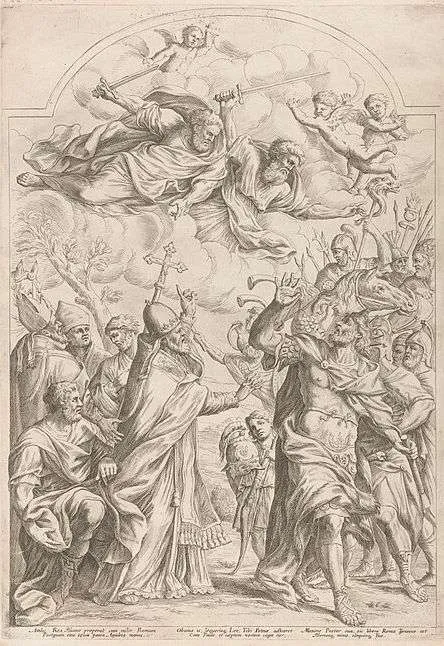1214–1270; Patron Saint of barbers, hairdressers, builders, construction workers, button makers, distillers, embroiderers, needleworkers, kings, sculptors, soldiers, stoneworkers, bridegrooms, parenthood, parents of large families, prisoners, sick people, and co-patron of the Third Order of Saint Francis; Invoked against the death of children and difficult marriages; Canonized by Pope Boniface VIII in 1297
Louis IX, born in Poissy, France, was the fourth child of the Crown Prince and Princess of France, Louis VIII and Blanche of Castile. When Louis was born, his grandfather, Philip II, had been King of France for thirty-four years. When Louis IX was nine, his grandfather died, and his father, Louis VIII, became king, but would only reign for three years. After his father’s death in 1226, Louis IX became King of France at the age of twelve. Because of his age, his mother acted as his regent until he was old enough to rule on his own at the age of nineteen.
As the son of a prince and then as a young king, Louis IX was well educated in Latin, public speaking, writing, military arts, and government. His private tutors were handpicked by his devoted mother, a faith-filled Catholic who saw to it that her children were well formed in the faith. One day, his mother reportedly told young Louis, “I love you, my dear son, as much as a mother can love her child; but I would rather see you dead at my feet than that you should commit a mortal sin.” This powerful statement of love from his mother resonated in Louis’s heart throughout his life.
During her time as Queen Mother and Regent of France, Blanche ruled with virtue. She supported monasteries and convents, practiced her faith well, was generous to the poor, and governed with justice. This had a profound effect on her king son. When Louis was eighteen, his mother chose Margaret of Provence, the thirteen-year-old daughter of Ramon Berenguer IV, Count of Provence, as his wife. Margaret was an ideal wife for Louis on account of her piety and virtue. The couple fell in love and had eleven children. They enjoyed spending time with each other—reading, riding, listening to music, and praying. It is often reported that this close bond caused Louis’s mother to be jealous, and she and her daughter-in-law had a strained relationship.
After his regency ended, King Louis’ subsequent reign of thirty-six years was marked by justice, care for the poor, arbitration, strategic alliances, crusades, and deep devotion. As for his devotion to the Catholic faith, King Louis was known as a man of prayer. As acts of interior devotion, he recited the Divine Office daily, attended Mass twice each day, and wore a hairshirt under his clothing. Perhaps the most inspiring legacy of King Louis’ faith can be found in a letter he wrote to his son in which he shares his fatherly heart, giving his son, the future king, guidance on how to be a good man and king. His letter is filled with practical exhortations of faith, by which he attempts to imprint on his son’s mind and heart the path to holiness.
These acts of piety also led to external works, such as engaging in public penances to inspire his subjects, building and supporting numerous monasteries and convents, and collecting holy relics that he housed in a chapel he commissioned, called the Sainte-Chapelle, or “Holy Chapel.” Most notably, that chapel is said to house the Crown of Thorns, which was King Louis’ most sacred relic. Because of his faith, King Louis also promoted the sacred arts throughout France and laid the foundation for academic institutions of theological excellence. Additionally, he was very committed to works of charity. He built hospitals for the sick and homes of reformation for prostitutes, and he personally cared for the poor.
King Louis was also a man of justice. He was known to spend long periods of time listening to grievances from his people and issuing just resolutions. He reformed the legal system and outlawed archaic and unjust practices. He put an end to wars among the nobility, seeking common sense solutions to their disputes rather than violence. His justice and morally upright reputation were so well known that other rulers even called upon him to help settle serious conflicts in other kingdoms, such as with the King of England and the English barons.
In 1244, the city of Jerusalem was taken by the Khwarazmian Turks, in violation of the Treaty of Jaffa of 1229. Though war should never be undertaken for aggressive and conquering reasons, self-defense or the defense of others is a moral duty. King Louis recognized that duty and was aware of his unique position to help. In 1248, King Louis set out with his army of crusaders to battle the Turks in what is known as the Seventh Crusade. His aim was Egypt, the center of Muslim power. Though he was initially successful in taking the city of Damietta, his army was decimated as they tried to advance, and the king was captured. After a short imprisonment, he was ransomed for an extremely large sum of money and then spent the next four years in Crusader-controlled strongholds in the Holy Land, giving them support and encouragement. After six years, he returned home to France where his mother had been ruling as regent in his absence.
In 1267, King Louis once again sensed a duty to defend the Holy Land. After three years of careful planning, Tunisia was selected as the target with the goal of converting the Muslim king to the Catholic faith, in hopes that the king would then help establish broader peace between Christians and Muslims. Unfortunately, upon arriving in Northern Africa, disease broke out in the Crusader camp. Among the dead was King Louis IX. His body was sent back to France, and his son, Philip III, succeeded him as king. In 1297, just twenty-seven years after Louis’ death, Pope Boniface VIII canonized Saint Louis on account of his deep personal piety, his efforts to reform and improve justice, and his leadership in two Crusades.
The life of a king in the High Middle Ages, with its riches and unchecked power, brought with it numerous temptations. Saint Louis was one of those rare souls who remained simple, humble, devout, just, thoughtful, morally upright, and prayerful throughout his reign. He is the only King of France to receive the sacred title “Saint.” As we honor this holy and just ruler, ponder the temptations he would have had to overcome in order to become universally recognized as a Catholic saint. As you do, ponder the qualities you most need in your life to overcome any of the snares that tempt you, so that you will fulfill your duties in accord with the mind and heart of Christ.
Source: https://mycatholic.life/saints/saints-of-the-liturgical-year/st-louis-king—august-25/








